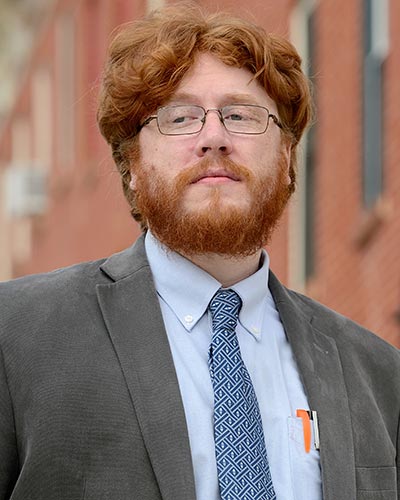From September 2022 to June 2023, Philip Garboden won’t be in his College of Social Sciences office in Saunders Hall. The Hawai‘i Community Reinvestment Corporation Distinguished Professor in Affordable Housing/Economics, Policy and Planning – housed in the Department of Urban and Regional Planning (DURP) and the UH Economic Research Organization (UHERO) – will be a Russell Sage Foundation Visiting Scholar in New York City. He will use that time to work on his forthcoming book, American Landlord (Princeton University Press) with co-author Eva Rosen, in the culmination of over a decade of work on the low-end housing market.
This Russell Sage Foundation recognition is a big deal for social scientists. Visiting scholars are provided a year of housing, salary support, and offices with access to electronic equipment and research materials to work on data analysis and writing projects. “I’m really excited, honestly,” said Garboden, who joined UH Mānoa in 2018. “I have wonderful colleagues at DURP and UHERO, but the pandemic has really kept everyone apart for the better part of two years. So I’m optimistically excited to be in a space explicitly designed for deep cross-pollination. And obviously, these relationships are something I can build on when returning to my regularly scheduled faculty position.”
Garboden grew up in Framingham, a commuting suburb of Boston. He attended Swarthmore College, a small liberal arts school outside of Philadelphia, where he met Caitlin Engelhard, who would become his wife. They both enrolled at Johns Hopkins University in Baltimore, Maryland – she attended medical school for a MD/PhD, he went on to earn two master’s degrees (in public policy and applied math/statistics) and a doctorate in sociology.
It was also at Johns Hopkins where Garboden met book co-author Rosen, who had a similar interest in the topics of housing vouchers and the importance of landlords. The two were part of a team that won a 2014 grant from the U.S. Department of Housing and Urban Development (HUD) to interview landlords, leading many years later to a book deal.
American Landlord will be based on over 150 interviews with landlords and property managers in four American cities to explore the supply-side dynamics of low-rent housing markets: Baltimore, Maryland; Cleveland, Ohio; Dallas, Texas; and Washington, D.C. Each interview lasted approximately two hours and was designed to focus on business strategies as well as professional and personal histories. The researchers also accompanied landlords as they went about their day-to-day – spending time in housing court, riding along with sheriff’s deputies as they conducted evictions, speaking with city officials and tenants, attending real estate auctions and joining investor association meetings.
And, oh, the stories Garboden has to tell. “The one I remember best was a former investment banker in Dallas who had semi-retired into real estate. He didn’t want to be interviewed formally, but he let me ride along with him for a couple of days,” he recalls. “My most vivid memory was when something in the back of his pickup got loose and he asked me to reach out the back window to try and hold it all down – all while his truck was screaming along the Dallas highways and he was actively screening tenants via text messages on his phone.”
Garboden also remembers a real estate investor with small, multiple investment properties who really struggled to make a living. “She’d almost lost everything when the housing bubble burst around 2007 and had experienced a lot of financial hardship. She was a divorcee with little to no marketable job experience, and she really felt that real estate was her path to wealth. When we spoke, most of her investments weren’t particularly profitable, but she was very committed. She’s doing it to this day.”
Overall, Garboden was pleasantly surprised by how many landlords were willing to be interviewed. “Whatever you may think about how power and influence actually works, landlords – like most people – don’t feel like their voices are heard in policy discussion. So they were mostly very interested in teaching us about what they do,” he said.
Supplementing the interviews will be administrative data from HUD, which provides unit, landlord and tenant data for all voucher subsidized units. The book is structured to reveal the complexities and contradictions of rental housing America by revealing how landlords view and perform their work. Chapter titles include “The Enigma of the Low-End Rental Market,” “Getting in on the Ground Floor: The Motivation for Investment” and “The Professional Tenant: Mythologizing the Poor as both Pitiable and Punishable.”
The next academic year will be quite the change of pace for Garboden, wife Caitlin (a faculty member in psychiatry at the UH John A. Burns School of Medicine and a child psychiatrist at Queen’s Medical Center) and their three children, ages 10 to 3. “I couldn’t imagine being away from all of them for a year,” said Garboden. “The subsidized housing maxes out at two bedrooms, so we’ll be living cozy, but I think it will be a great adventure.”
